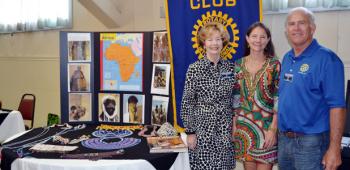
Complete with photos and items from Africa, Isabella D. Crane, center, presented a program on African currency and costume and provided insight on some of the continent’s varying cultures at the Rotary Club of Crowley’s Tuesday meeting. Serving as program organizer was Isabella delaHoussaye, left, and the meeting was led by President Scott Shumacher.
Crane provides informative look into African culture
Jeannine LeJeune is the online editor for the Crowley Post-Signal. She can be reached at jeannine.lejeune@crowleytoday.com or 337-783-3450.
For years now, Isabella D. Crane has been interested in things from abroad – their cultures, their geopolitics, etc. – and she has traveled to these countries to learn more.
Tuesday, she shared what she has learned through her numerous visits to Africa with the Rotary Club of Crowley, showing off part of her vast collection of African artifacts of currency and costume.
“I collect everything,” she said. “I might see something and think, ‘That’s interesting.’ Then, I’ll learn more about it and become even more interested.”
Using currency and costume, she parlayed some of the nuances of African culture to the club.
Crane began by showcasing some of the many forms of currency she has collected over the years, including metals, glass beads, textiles and tools.
In Africa, she explained, the value of the currency stemmed from the tribes, particularly in pre-colonial Africa. Currency is also sometimes worn in the country to show status. For example, a woman’s marriage dowry, may be sewn onto the end of her veil or she may wear cuffs or collars.
On the bead work front, Crane explained that if you look at where bead work survived, you can see a clear path of where missionaries did not travel as mission workers told the Africans that bead work was the work of the devil.
She also explained that the textiles as currency were created all by hand and typically took months to create.
Crane also called upon not only members of her own family and her friends, but some of the Rotarians to help show off some of the African costumes she has accumulated as well.
Costumes, as she explained, were also a means of displaying status. Without saying a word, members of a tribe and an area would know who or what a person is by the outfit he or she had on, according to Crane.
She showcased costumes from more than 10 different tribes and regions of Africa, all providing a deeper look into African culture.
As she would later explain, Africa does not have much — if any at all — mobility in statuses.
“You don’t just upgrade your status there,” said Crane.
However, the country is full of people who respect each other’s status, understanding that they are all interdependent that live under the honor system.
- Log in to post comments
